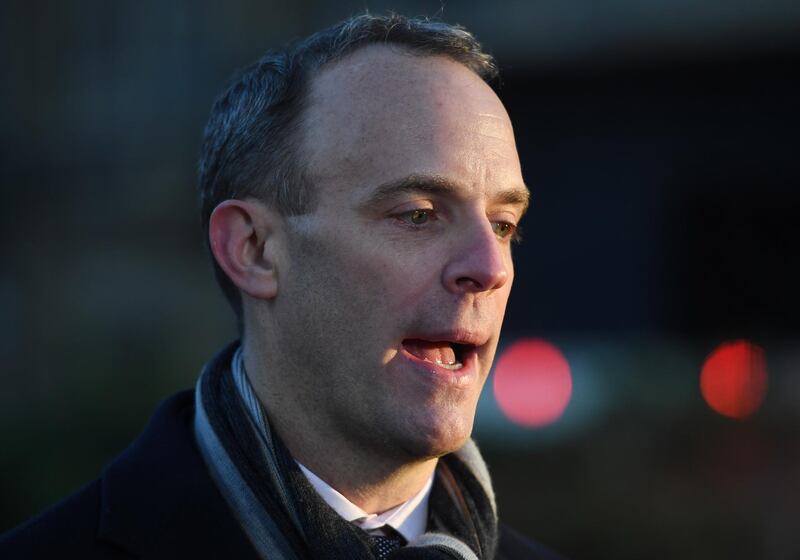The Know Nothings have a long, inglorious history in US politics. In the late 1840s, groups of white protestants formed the unfortunately named Native American Party to oppose immigration to the US. They were extremely hostile to the Roman Catholic church, which they believed was a conspiracy. Party members were told to keep their views secret and, if questioned, to say: “I know nothing.” They may have quickly faded into obscurity, but their spirit remains strong on both sides of the Atlantic.
The man once tasked with taking Britain out of the European Union, Britain's former Brexit Secretary Dominic Raab was questioned recently by a House of Commons committee and asked whether he had ever read the document, known as the Good Friday Agreement, which brought peace to Northern Ireland in the 1990s. Mr Raab said he had not. I remember reading it years ago. From memory it is around 35 pages long and can be read in about the same time as a daily newspaper. The fact that Mr Raab never read it is quite extraordinary, especially since Northern Ireland is a key reason all his Brexit plans fell apart.
The Good Friday Agreement has meant the European Union is insisting on special arrangements affecting the border between Northern Ireland and the Irish Republic, known as “the backstop.” Sticking with the agreement has so far torpedoed any Brexit deal, so you might think that the man tasked with negotiating Brexit could have taken an hour out of his day to familiarise himself with it. But on this subject, central to Brexit’s diplomatic impasse, Mr Raab chose to know nothing.
Donald Trump, meanwhile, has assumed the role of Know Nothing on a wide range of issues. A recent severe winter cold snap provoked this Tweet from the president: "In the beautiful Midwest, windchill temperatures are reaching minus 60 degrees, the coldest ever recorded. In coming days, expected to get even colder. People can't last outside even for minutes. What the hell is going on with Global Waming? Please come back fast, we need you!"
Setting aside the misspellings, the bad grammar and the clumsy attempt at humour, you might think that some White House aide could at least explain to the president the difference between weather and climate. Step outside and you experience today's weather. Look at years' worth of facts, including sea temperatures, and you will soon understand climate change, which, beyond all reasonable scientific doubt, is warming the planet to a catastrophic degree. British school children, some as young as five, have been taught about this and recently staged protests to encourage politicians to stop knowing nothing. That may take some time.
Of course, no one expects political leaders to know everything. But one characteristic of our age is that those who do know nothing about a subject are often the same people who voice strident and controversial opinions on that very subject. This month Daniel Kawczynski, a Tory MP, roundly asserted, for example, that the UK never benefited from the Marshall Plan to rebuild Europe after the Second World War. Thirty seconds on Google would have revealed that Britain was the greatest beneficiary of this American gift to democracy.
Mr Kawczynski never corrected his statement, yet demonstrating such profound ignorance appears not to harm people’s political careers. Why? The puzzling question may be answered by what psychologists call the Dunning-Kruger effect. David Dunning and Justin Kruger noticed that courtroom witnesses and politicians making television appearances tend to be believed by juries or TV viewers if they appear to be confident in what they are saying.
Dunning and Kruger believe that this is because people of questionable ability are often unable to recognise their own shortcomings. The Know Nothings think they are superior individuals, despite all the evidence that points to them being incompetent. Tempting as this idea may be, there could be another explanation. Perhaps the supposed Know Nothings look better from a historical perspective.
When he was US president in the 1980s, Ronald Reagan was often characterised as a dimwit. I have a book from that period titled Ronald Reagan's Reign of Error, full of genuine Reagan quotes that appear to confirm that he really did know nothing. But Reagan shifted the centre of gravity of American politics towards smaller government and confrontation with the Soviet Union, which collapsed in 1989, the year he left the White House.
US historians cite the Greek poet Archilochus when considering Reagan: "The fox knows many things, but the hedgehog knows one big thing.” Reagan, they say, was a hedgehog, not especially learned, but single-minded and effective. Perhaps history will also be kind to Mr Trump and Mr Raab, although I suspect they are firmly in Dunning-Kruger territory. As Mark Twain once wrote, “All you need in this life is ignorance and confidence and then success is sure.”
Gavin Esler is a journalist, author and television presenter






